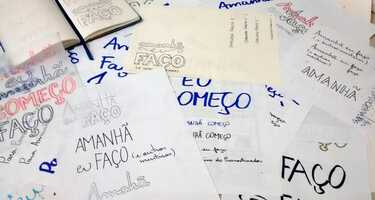Amanhã eu faço e outras mentiras: livro interativo para incubação voluntária
A ação de deixar para amanhã o que se pode fazer hoje é repetida incontáveis vezes durante a nossa vida, por incontáveis pessoas, sem distinção de cultura, língua, gênero ou idade. Nesse momento, alguém está procrastinando em algum lugar. É um hábito comum, criticado e combatido como se fosse um mal da atualidade. Mas o tempo para a preguiça nem sempre foi visto como um problema, muito pelo contrário: "era nele que se produziam as ideias filosóficas, artísticas e políticas.”¹. Nossa relação com o tempo, ao longo da história sofreu uma série de alterações para se adaptar a métodos de trabalhos vigentes, ou preceitos religiosos. Absorvemos e naturalizamos hábitos que, apesar da evolução tecnológica a favor do menor esforço, não conseguimos nos desfazer. Meu objetivo com esse projeto é mostrar que a procrastinação não precisa ser encarada como a inimiga da produtividade, e que o tempo ocioso é fundamental para a criatividade. Proporcionar uma reflexão sobre como cada um lida com o tempo ocioso e com o tempo do trabalho, a importância que se aprenda a tirar prazer do ócio, e que não fazer nada não significa a não produção de nada.
The action of putting off until tomorrow what can be done today is repeated countless times during our lives, by countless people, regardless of culture, language gender, or age. At that moment, someone is procrastinating somewhere. It is a common habit, criticized and fought as if it were a modern evil. But time for laziness has not always been seen as a problem, quite the contrary: "it was in it that philosophical, artistic, and political ideas were produced"¹. Our relationship with time, throughout history, has undergone a series of changes to adapt to the prevailing work methods or religious precepts. We have absorbed and naturalized habits that, despite the technological evolution in favor of less effort, we can't seem to get rid of.My objective with this project is to show that procrastination need not be seen as the enemy of productivity, and that idle time is fundamental to creativity. To provide a reflection on how each one deals with idle time and work time, the importance that one learns to take pleasure from idleness, and that doing nothing does not mean not producing anything.
